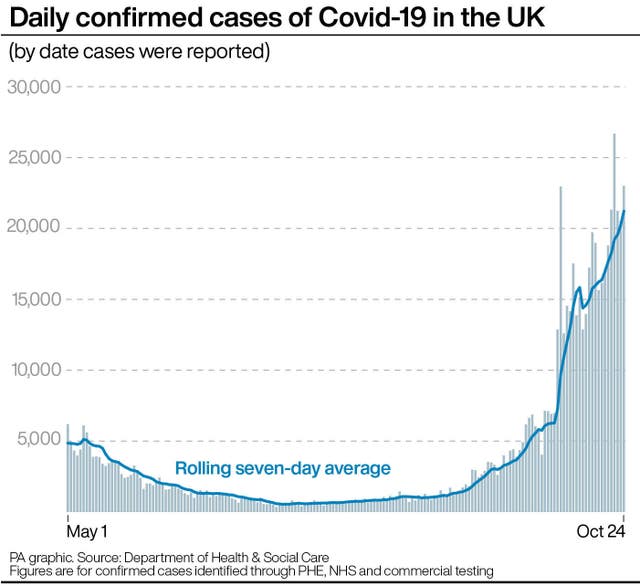
Contacts of people infected with coronavirus may have to self-isolate for as little as seven days amid concerns in Whitehall about the levels of public compliance with the Test and Trace system.
Officials on the Government’s Covid-19 taskforce are understood to be examining the case for reducing the current fortnight period of isolation to between 10 days and a week.
The move – which would not apply to those who test positive for the disease – comes amid growing dissatisfaction with the performance of the system from ministers and MPs.
Boris Johnson was said to have become “disillusioned” with statistics provided by the service after they proved to be wrong, according to The Sunday Telegraph.
 (PA Graphics)
(PA Graphics)
At the same time, there were said to be concerns that the prospect of a lengthy period indoors if they are contacted by Test and Trace is deterring people from co-operating.
The Telegraph quoted a No 10 source as saying: “Compliance is not as high as we would like and self-isolation is key if we are going to beat the virus.”
It comes after Test and Trace – headed by the Conservative peer Baroness Harding – last week hit a record low with just 59.6% of the contacts of people who tested positive for the disease being successfully contacted and told to self-isolate.
In a further sign of the unrest at Westminster, senior Tory backbencher Sir Bernard Jenkin launched a scathing attack on the performance of the system, saying public consent and co-operation was “breaking down”.
Writing in The Sunday Telegraph, he said there was a “vacuum of leadership” at the top of the organisation and called for a change that was “visible and decisive” with a senior military figure being put in charge.
“There is a spaghetti of command and control at the top, which is incapable of coherent analysis, assessment, planning and delivery,” he wrote.
“The immediate priority is to fill the vacuum of leadership in Test and Trace, which is destroying cooperation and compliance.
“Government harnessed the military to regain control in the foot and mouth crisis; the Prime Minister should follow that example today, by installing a single leader, a three or four star military commander with a reputation for handling complexity under stress.
 Baroness Harding is facing calls to be replaced by a senior military figure (Dominic Lipinski/PA)
Baroness Harding is facing calls to be replaced by a senior military figure (Dominic Lipinski/PA)
“Test and trace should then be tasked with generating and sustaining a campaign targeted at achieving behaviour change by consent.”
Sir Bernard, who chairs the Liaison Committee of senior MPs which questions the Prime Minister twice a year, added that Lady Harding should be given a “well-earned break” so she and others could “reflect on the lessons learned so far”.
In response, the Department of Health and Social Care acknowledged there were areas where the service needed to improve, but said people should be “talking it up, not down”.
“Dido Harding and her leadership team – drawn from the military, public and private sectors – have built the largest diagnostic industry the UK has ever seen,” a spokesman said.
“It is the equivalent of building an operation the size of Tesco in a matter of months. The NHS Test and Trace system has built a testing capacity of 400,000 tests a day, from a starting point of 2,000 a day in March.
“This capacity is bigger per head than France, Germany, Italy and Spain and we have contacted over 1.1 million people and asked them to self-isolate.
“We need to improve in areas and we are very much focused on that, but we should be talking it up, not down.”


Why are you making commenting on The Herald only available to subscribers?
It should have been a safe space for informed debate, somewhere for readers to discuss issues around the biggest stories of the day, but all too often the below the line comments on most websites have become bogged down by off-topic discussions and abuse.
heraldscotland.com is tackling this problem by allowing only subscribers to comment.
We are doing this to improve the experience for our loyal readers and we believe it will reduce the ability of trolls and troublemakers, who occasionally find their way onto our site, to abuse our journalists and readers. We also hope it will help the comments section fulfil its promise as a part of Scotland's conversation with itself.
We are lucky at The Herald. We are read by an informed, educated readership who can add their knowledge and insights to our stories.
That is invaluable.
We are making the subscriber-only change to support our valued readers, who tell us they don't want the site cluttered up with irrelevant comments, untruths and abuse.
In the past, the journalist’s job was to collect and distribute information to the audience. Technology means that readers can shape a discussion. We look forward to hearing from you on heraldscotland.com
Comments & Moderation
Readers’ comments: You are personally liable for the content of any comments you upload to this website, so please act responsibly. We do not pre-moderate or monitor readers’ comments appearing on our websites, but we do post-moderate in response to complaints we receive or otherwise when a potential problem comes to our attention. You can make a complaint by using the ‘report this post’ link . We may then apply our discretion under the user terms to amend or delete comments.
Post moderation is undertaken full-time 9am-6pm on weekdays, and on a part-time basis outwith those hours.
Read the rules here